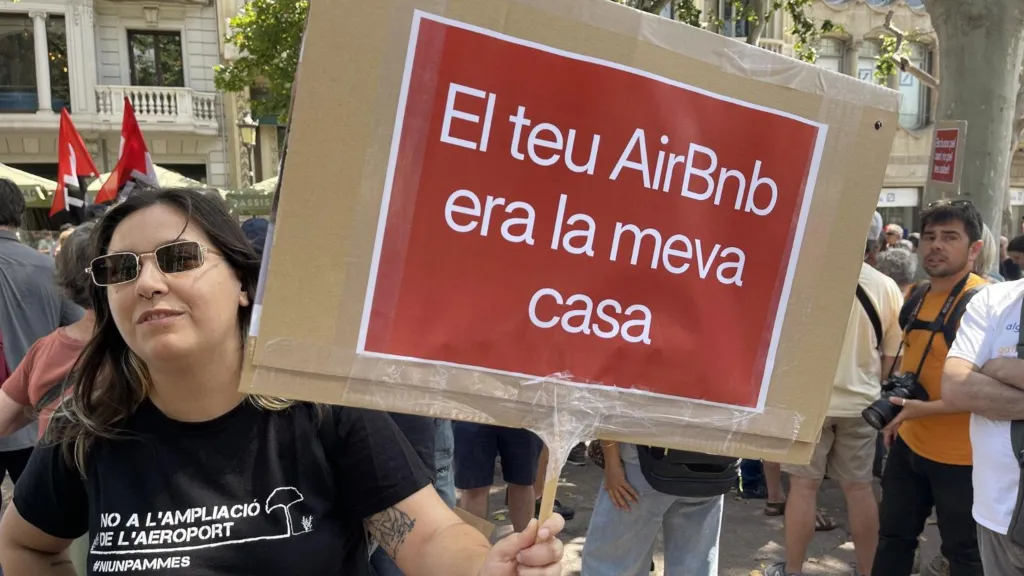Barcelona, renowned for its iconic architecture, Mediterranean charm, and artistic legacy, is facing increasing unrest among its residents. On June 16, 2025, protests erupted in Central Barcelona as locals voiced their frustrations with the overwhelming number of tourists and the deepening housing crisis. The city, once celebrated as a cultural haven, is now a battleground between economic interests and residents’ rights.
Protest Highlights: Locals Push Back Against Tourist Crowds
The protest coincided with the city’s Westfest Festival, initially starting as a peaceful demonstration. However, tensions escalated when protestors began shouting at tourists to “go home.” Incidents included tourists being sprayed with water pistols and a luxury clothing store being plastered with anti-tourist stickers. What began as a festive gathering quickly turned chaotic, reflecting a breaking point in the community’s patience.
The Heart of the Issue: Displacement and Skyrocketing Rents
At the core of the protest is a growing sense of displacement. Barcelona, like many tourist hotspots across Europe, has seen its neighborhoods transformed by short-term rentals, particularly through platforms like Airbnb. Former residential homes are now vacation properties, driving up rent and forcing locals out.
One protester, Marina, held a sign reading, “Your Airbnb used to be my home.” She shared, “We can’t afford to live here anymore. Rents are too high, and everything is catered to tourists.” Her words echoed the sentiment of many residents who feel alienated from the city they once called home.
Locals Struggle to Afford Basic Living
For young professionals like Elena, a marine biologist, the city’s high cost of living is unsustainable. “Even coffee is expensive now. Salaries haven’t kept up with the rise in prices caused by tourism,” she lamented. Older residents like 80-year-old Pepi Viu have also suffered—she was evicted after decades in her home to make way for short-term rentals. “Now, tourists live where we used to. We have nowhere to go,” she said.
Longtime Residents Refuse to Give In
Joan Alwarz, a resident of the Gothic Quarter for 25 years, is one of the few who remains in his building, which is now mostly converted to tourist flats. “This is about principle, not just money. We’re being pushed out of Central Barcelona,” he said defiantly.
Landlords Defend Tourist Rentals
Not everyone agrees with the protestors. Jesus Pereda, who owns two tourist flats, argues landlords are being unfairly blamed. “Licenses were frozen 10 years ago, but rents still rose. We’re just easy targets,” he said. He attributes rising costs to “digital nomads” willing to pay more—not just tourists. Jesus also claims that tourism helps spread income across the city and is essential to Spain’s economy, contributing nearly 15% to its GDP.
Government Response: Crackdown on Short-Term Rentals by 2028
In response to mounting pressure, the local government has announced a plan to ban all short-term tourist rentals by 2028, revoking licenses for roughly 10,000 properties. This move aims to ease the housing crisis and return homes to residents. However, property owners fear the financial impact and warn of a potential collapse in the rental market.
A Europe-Wide Problem: Over-Tourism in Major Cities
Barcelona’s struggle is part of a wider trend in southern Europe. Cities like Venice, Rome, and Paris are also grappling with the effects of over-tourism—rising rents, vanishing local communities, and a loss of cultural identity. While tourism is vital for these cities’ economies, residents are demanding policies that protect their way of life.
Residents Call for Balanced and Sustainable Tourism
Protesters emphasize they are not anti-tourism. “Tourism is good—but not like this. It needs to be at a sustainable level,” said Marina. Locals are calling for a balanced model that ensures tourism supports, rather than displaces, communities.
Conclusion: Barcelona at a Crossroads – A Wake-Up Call for Global Tourism
As the summer tourist season kicks off, cities like Barcelona face a critical challenge: how to balance tourism with livability. The 2025 protests serve as a stark reminder that unchecked tourism can damage the very communities that make destinations so desirable.
Barcelona’s upcoming policy changes may set a precedent for other global cities dealing with over-tourism. While the full impact remains to be seen, one thing is clear: the conversation around sustainable tourism is not going away. For cities to thrive, both visitors and locals must coexist—respectfully and sustainably.

